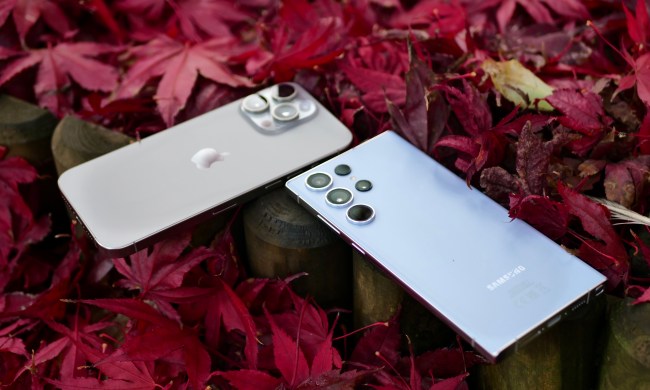
FireEye researchers Tao Wei and Yulong Zhang demonstrated at the Black Hat conference how hackers can remotely steal fingerprints without the owner of the device ever knowing about it. Even more dangerous, this can be done on a “large scale.”
Updated on 08-11-2015 by Robert Nazarian: Added in comments from HTC, Samsung, and Yulong Zhang.
We reached out to both HTC and Samsung to confirm patches were issued for both the HTC One Max and Galaxy S5. We also asked Samsung if the Galaxy S6, Galaxy S6 Edge, or any other devices have the same vulnerability.
“We have already addressed the issue for the HTC One Max, and it doesn’t affect any other HTC devices.”
Based on the following comment from HTC, we feel confident that all carrier versions of the One Max were patched:
“HTC is aware of the FireEye report on fingerprint scanner security. We have already addressed the issue for the HTC One Max in all regions, and it doesn’t affect any other HTC devices. As always, HTC takes security issues very seriously and makes it a top priority.”
Samsung’s comment makes no mention about a patch update, but does indicate that all Galaxy S5 phones are safe:
“Samsung takes fingerprint security very seriously, and we are aware of FireEye’s report on a vulnerability with the fingerprint sensor. After a thorough review with FireEye, it was found that all Galaxy S5 users’ data remain safe.”
Unfortunately, Samsung didn’t mention the status of the Galaxy S6, Galaxy S6 Edge, or any other phones that have fingerprint sensors. We have reached out to the company again, and we will update this post when we hear back.
“After a thorough review with FireEye, it was found that all Galaxy S5 users’ data remain safe.”
We also contacted Yulong Zhang and asked him about the Galaxy S6, Galaxy S6 Edge, or any other phones that might be vulnerable to the Fingerprint Sensor Security Attack. Unfortunately, he could not provide insight into whether it impacts other devices.
Zhang reiterated the iPhone isn’t vulnerable since the fingerprint data is encrypted. Apple purchased AuthenTec in 2012, which provides the fingerprint sensors for the iPhone. Apple’s ownership in the company makes it easier to control the security, whereas Samsung and other Android manufacturers are at the mercy of third-party hardware companies.
HTC’s and Samsung’s fix involves locking down the fingerprint sensors, but the data remains unencrypted because of hardware limitations. Android manufacturers will likely be able to secure hardware that allows them to encrypt fingerprint data in the future.
With all this negativity surrounding fingerprint sensors, Zhang still feels that using them the best way to secure phones and tablets. Fingerprints can’t be guessed, but passwords can, especially for those that use simple PIN codes like 1234.
What is the Fingerprint Sensor Spying Attack?
The “Fingerprint Sensor Spying Attack” works with Samsung, HTC, and Huawei phones. According to Wei and Zhang, some manufacturers fail to lock down the fingerprint sensor. Apparently some are only guarded by system-level privileges instead of root, which makes it easier to hack into. Most security-related software requires root access, making it more complicated for hackers to thwart.
It wasn’t explained how the hacker actually gains access to the fingerprint sensor itself, but the attacker can continue to read fingerprints for the life of the phone once the attack is in place.
It was also shown that through a different attack, “Confused Authorization Attack,” how a hacker could provide a fake lock screen that would actually enable a money transfer in the background once a fingerprint is accepted. The report didn’t indicate if any current phones are actually vulnerable to this type of attack though.
Obtaining a fingerprint could be very serious since they are not only used to unlock the device, but also used to make mobile payments and banking transactions. Fingerprints are also tied to you personally and obviously cannot be altered or changed.
It’s not clear how panicked you need to be on this one. Wei and Zhang demoed the Fingerprint Sensor Spying Attack on the older Samsung Galaxy S5 and HTC One Max, but didn’t mention if the newer Galaxy S6 or Galaxy S6 Edge has the same vulnerability. Furthermore, the report indicates that both Samsung and HTC issued patches after being notified about the vulnerability.
Now, if you happen to be an iPhone user, you will be happy to know that Apple does a better job at encrypting the fingerprint data from the scanner. The good news is that Google is implementing fingerprint security support in Android M, so it’s likely to be more secure on all Android phones moving forward. Speaking of that, Wei and Zhang recommend that consumers always buy the latest phones with the latest software for better protection.


